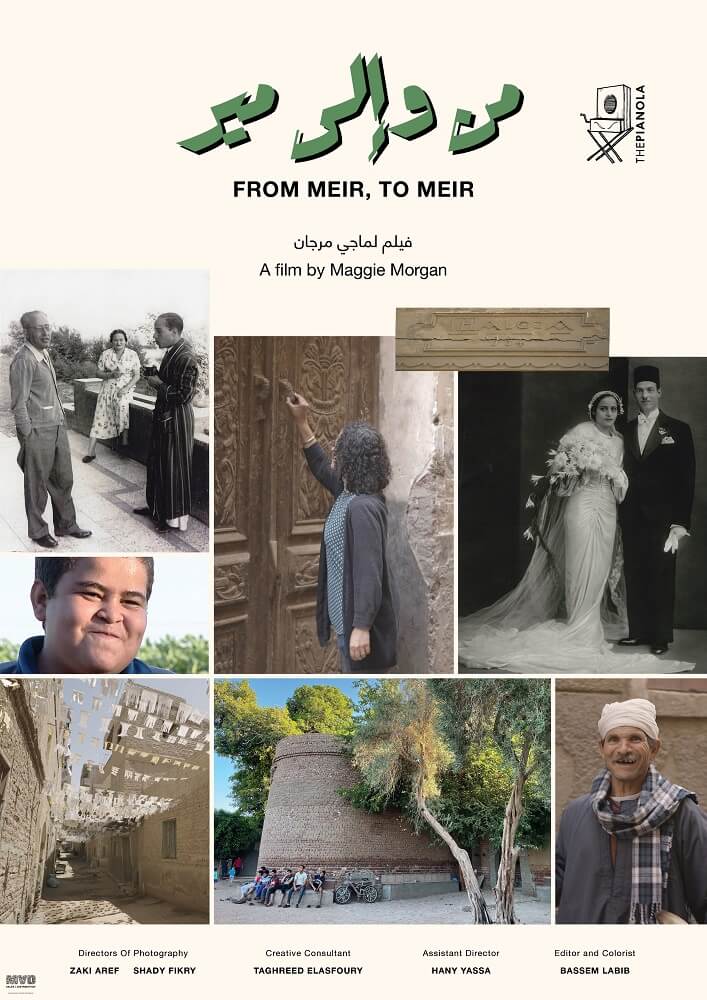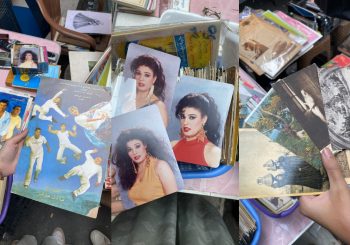
Earlier this July, Netflix released a collection of 21 Arab films by female filmmakers as part of its ‘Because She Created’ campaign.
The films, drawn from 11 countries, range from short to feature-length, and are of various genres.
According to the launch’s press release, the campaign celebrates the “beautiful, complex” stories of women storytellers, from the Middle East and North Africa (MENA) region, and aims to “amplify their underrepresented voice.”
Here are our reviews on the six featured stories by Egyptian women, organized by year of release.
Harag W’ Marag – Chaos, Disorder (2012)
Score: 3/5

The story goes as follows.
Zaki (Mohamed Farrag) and Mounir (Ramsi Lehner) star in Nadine Khan’s debut feature-length film as two men who want to marry the confident Manal (Ayten Amer), daughter of the neighborhood grocer (Sabry Abd El Monem). Despite explicitly rejecting Mounir for Zaki at the start of the film, Mounir ignores her decision and, through blackmailing her father, decides to make her the prize of whoever of the two wins a football match.
Aside from Sayed Ragab’s narration and the playful piano transitions, not much gives a defining character to the film. Despite this, it does manage to fulfill its titular promise; it is chaotic and disorderly but remains somewhat entertaining.
Al-Khoroug Lel-Nahar – Coming Forth by Day (2012)
Score: 2.5/5

‘Coming Forth by Day’, set in the days before the 2011 revolution, showcases a day in the life of Soad (Donia Maher), a 30-year-old woman, burdened by obligations to her struggling family, the members of which she loves but is either resentful of or feels pity towards. Starting her days to the persistent onset of calls from her mother, Soad is confronted with her daily realities of taking care of her ill father, managing her personal frustrations, and being stuck in a monotonous cycle that seems unending for the most part.
Directed by Hala Lotfy as her debut effort, the film feels deeply authentic, if rather slow-paced at times, and brings to mind many real-life examples who lead similar lives. Some scenes feel deliberately stretched out, particularly in the beginning, to emphasize Soad’s feeling of tedium and immobility in life, which might discourage viewers from continuing. However, Maher’s seemingly effortless acting, reaching out and sharing Soad’s everyday story with the world using her bare-faced, nuanced expressions, coupled with a teary-eyed Al Nagar portraying the worn-out Hayah as Umm Kulthum plays on, partially makes up for the uneventful, long stretches.
Ehkeely – Let’s Talk (2019)
Score: 4/5

In ‘Let’s Talk’ (2019), Marianne Khoury presents an honest, intimate view of the lives of four generations of women in her family, starting with her grandmother, her mother, herself, and ending with her daughter Sara. Using dialogue, archival interviews and material, and pieces of her maternal uncle Youssef Chahine’s semi-autobiographical Alexandria quadrilogy (1979-2004), Khoury confronts her past and investigates the relationship dynamics of the females in the Chahine/Khoury world as she begins to address the faults, fears, and love driving the actions of those strong women.
In some scenes, where the candid reflections make it almost too intrusive to keep watching, it feels prudent to look away from seeing moments as personal and private as these familial dynamics. Yet, doing so is impossible. Even with shaky footage shot on her phone, Khoury manages to capture audiences in her grasp, wondering if talking it out might actually change everything.
Men Al-Qahera – From Cairo (2021)
Score 3.5/5

“I’m not defeated
I’m not a winner
I’m not relieved
I break with every step
then return one piece”
– Foad Hadad
With this opening quote and a voiceover recounting the crippling fears she overcomes each day whilst attempting to live in the relentless city, director Hala Galal begins her hopeful documentary ‘From Cairo’. It follows the story of two women, Heba and Aya, who face similar societal fears that manifest differently; while Aya moves to improve her own life, Heba is tied to the desire to create a better life for her daughter, Ward.
Although the idea of itself is not new, nor are the stories being told, the authenticity of the women and their stories stand out. Survival is not an impossible feat; Egyptian women like Heba, Aya, and Hala do so every day under the crushing fist of Cairo. Yet, seeing those women truly alive on film, content on film, laughing on film, skating on film, forcing their dreams out onto the world on film despite all the fear, is more than what could normally be expected; and the simplicity of it all warms the heart.
Min Wa Ila Meir – From Meir, to Meir (2021)
Score: 4.5/5

Curious and driven only by her grandmother Saneya Loza’s love for the small village of Meir, 400 kilometers south of Cairo near Assyut, director Maggie Morgan finds herself at her grandparents hometown for the first time in 2008. While visiting, Morgan experiences both the vibrant and the gloomy reality of Meir. She gets to attend different joyous occasions including a sebou’ (a baby shower), a henna (bachelorette party), Easter celebrations and the Keshk season among numerous others.
Throughout the first half of the documentary, not only does Morgan witness the centuries-old traditions and rituals that were still being upheld by the people of Meir, but she also briefly interviews others whose roots stem from there (the Greiss and Loza families), who still hang onto the heritage of their landowner ancestors and the norms of their culture.
The second half narrates a saddening reality of the Meir youth, who either want to flee the town and cannot do so, or would rather die than continue living in it. With no one but Amm Samir to document the births and deaths of the inhabitants, acting as an unofficial civil registry, an endemic of suicide plagues the homes of Meir.
In this love letter to Meir, Morgan ensures that the core realities of her hometown are exposed: the cruel passage of time, the bittersweet reality of its people. Each element shakes viewers to their core and evokes a visceral, if not lingering sense of melancholy. In only 12 years, Meir has changed irrevocably—for better or worse.
Hammam Sokhn – Trapped (2021)
Score: 3/5

A woman trapped with a man in a small mobile shop, a woman trapped with a girl in a seemingly empty building, and five women from varying walks of life, also trapped together in a hammam (bathhouse). While some are in hiding, attempting to escape the keen eye of covert police, others are trapped by virtue of existing in the wrong place at the wrong time.
In this compelling but surprisingly uneventful film set against the backdrop of the early days of the 2011 January Revolution, director Manal Khaled and writer Rasha Azab display three stories of women stuck, either cornered into spaces while escaping or by being forced into them. ‘Trapped’ is a snapshot of allegedly true stories.
Ultimately, though, the film is not simply about being confined by necessity or against our will — either metaphorically by the expectations of society or literally by corrupt police officers — but it is about the kindness one is blessed with when we are and as we try to escape our inner conflicts. I leave it up to you whether it succeeds in conveying that clearly enough.
Subscribe to the Egyptian Streets’ weekly newsletter! Catch up on the latest news, arts & culture headlines, exclusive features and more stories that matter, delivered straight to your inbox by clicking here.







Comment (1)
[…] مراجعة: يعرض فيلم Netflix “لأنها خلقت” 6 أفلام رائعة ل… أهم الأعمال الدرامية التركية المدبلجة يتم بثها الآن في الولايات المتحدة الأمريكية من خلال خدمة البث العربية ‘Sling’ […]